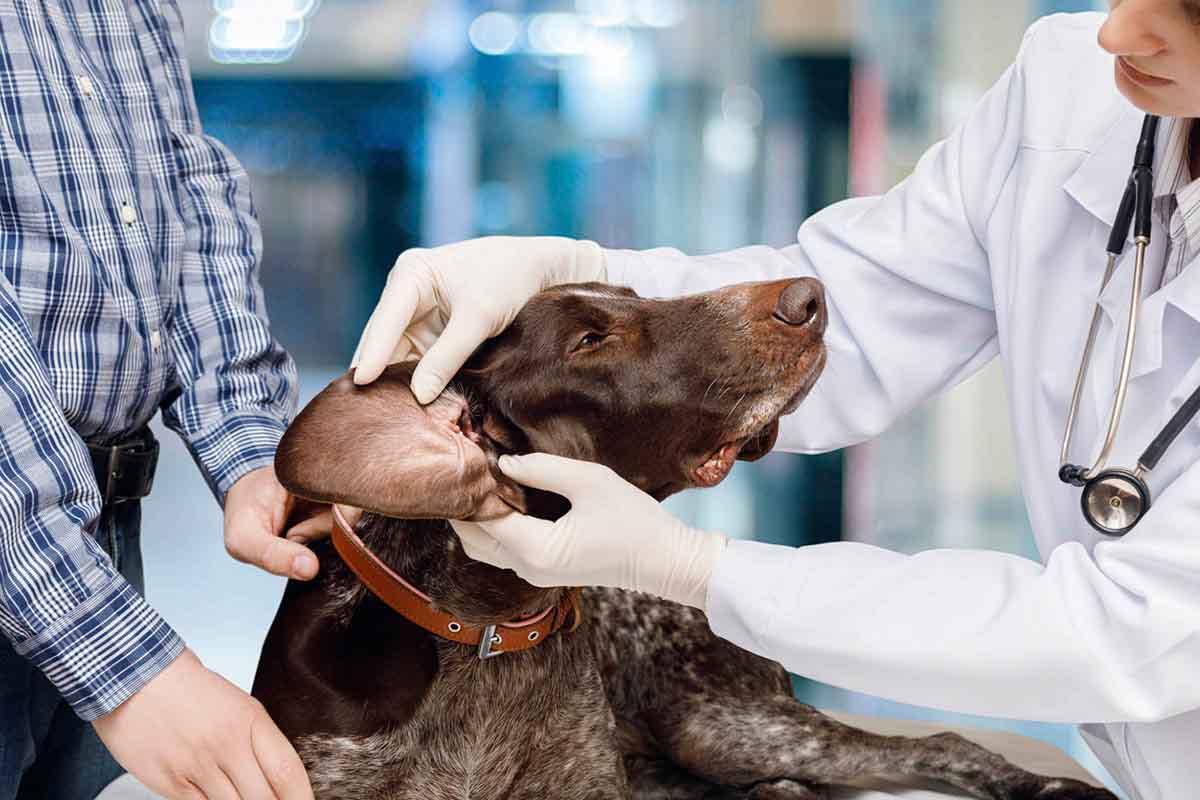How to Settle a Dog’s Tummy
There are few things more concerning than watching your pooch having problems with his digestive system. Here's what you can do to help ease your dog’s upset stomach.
There are few things more concerning to a loving pet parent than watching their pooch having problems with his digestive system. He’s so uncomfortable, but is there anything you can do to help ease your dog’s upset stomach? How can you help settle a dog’s tummy?
Of course, if his intestinal distress is something more than simply an occasional upset tummy or if your furry friend has other symptoms, then you’ll want to make an appointment with his veterinarian.
But what can you do to help soothe your dog’s tummy while you wait to see the vet? Let’s take a deeper dive into the symptoms of an upset stomach, the digestive issues that can cause it, and any remedies that may help until you can get your pooch checked out.
What are the Symptoms of Tummy Troubles?

There are a number of common symptoms of an upset stomach in dogs. Some of them, you almost certainly already know, but some are a little more subtle. Here are some of a dog’s symptoms that indicate stomach problems.
Vomiting
This is one you’ve surely seen. Dogs might vomit up their food or just saliva, and this is often accompanied by retching or gagging.
With retching, dog vomiting, or gagging, you will see your dog’s stomach contracting. This is different from the occasional regurgitation of food, where you won’t see the stomach muscles contracting. Regurgitation almost always happens right after eating some food and requires no effort. In fact, your dog is usually just expelling food from his mouth when he regurgitates as opposed to actually expelling it from his stomach.
Drooling and other mouth movements
Aside from drooling and excessive salivation, you might also see chattering teeth or lip-smacking. When you think about it, it’s not all that different from your behavior when you have an upset stomach. You might smack your lips as you try to settle your stomach.
Belching, passing gas, and other stomach noises
Just like with your stomach issues, you might notice your pooch belching frequently or passing gas when he’s got a stomach ache. You could also hear excessive stomach noises, just like what happens when you have a stomach problem.
You might also see some bloating, though this one is worth keeping an eye on, as it can indicate a life-threatening condition called gastric dilatation and volvulus, or GDV. This is a more common problem in large-breed dogs, and it requires immediate medical attention.
Diarrhea, more bowel movements, and other defecation issues
Even if the problem seems to be in your dog’s stomach, you might see other gastrointestinal symptoms. These include diarrhea or soft stools, an increased frequency of bowel movements, constipation, and tenesmus, which means straining to defecate. This might indicate that what started as a stomach problem is affecting the entire digestive tract.
Loss of appetite and weight loss
Your buddy’s tummy troubles might certainly cause him to lose his appetite. That’s understandable, and if it goes on long enough, he could also begin to lose weight. Your dog’s digestive system, just like yours, is an important part of his overall health, and problems with it can definitely cause other symptoms.
Lethargy, fever, and restlessness
When your pooch has a stomach problem, it can indicate a more widespread issue. Some bacterial infections, for example, can cause more widespread digestive issues, and your dog’s body might react by spiking a fever. This is his attempt to fight off the bacterial invaders.
You might also notice that your dog is lethargic because he doesn’t feel well. On the other hand, he might also be restless as he tries to ease his stomach pain. You might also see him shivering or trembling because of a fever.
Abdominal pain
This is yet another symptom of problems with your dog’s digestive system. You might notice him vocalizing when you try to pick him up or even when he stretches his front legs or while standing on his hind legs. This indicates his tummy hurts.
Dehydration
Because your pooch’s stomach hurts, he might not be drinking as much water as he normally would, he could become dehydrated. Additionally, if he has diarrhea, that can cause dehydration as well. Signs of dehydration include:
- loss of skin elasticity (if you pick up a piece of his skin, it doesn’t return to normal as quickly as it should)
- lethargy
- dry, stringy saliva
- a dry nose
- tacky, dull gums
What are the Causes of Tummy Troubles?

There are several common causes of stomach issues in dogs. They range from something like eating a new food to ingesting some kind of foreign material or toxin to an underlying systemic disease.
While any dog can develop an upset stomach, puppies and senior dogs are at a higher risk, given that they typically have weaker immune systems. Having said that, some of the usual suspects include:
- pathogens, like bacteria and viruses, which cause gastroenteritis
- internal parasites
- a change in your dog food
- eating too quickly
- eating human food
- ingesting a foreign material
- certain medications
- certain health problems, like ulcers, underlying diseases, pancreatitis, inflammatory bowel disease (IBD), parvovirus, food allergies, heat stroke, or even cancer.
Given the wide variety of possible causes, you can understand why it’s vital to have your veterinarian check out your best buddy so that any treatment can be tailored to the reason behind the problem. Of course, it’s also possible that your dog has a sensitive stomach, and you might need to put him on a bland diet, including bland foods such as lamb and white rice, to help prevent further problems.
How are Stomach Problems Diagnosed?
While many cases of an upset stomach in dogs will resolve themselves, it’s important to get your dog checked by his veterinarian in certain circumstances. If he stops eating or drinking, is lethargic, and has frequent, persistent vomiting or diarrhea that lasts for more than 24 hours, it’s time to go to the vet. Additionally, if you see blood in his vomit or diarrhea or if you know he ingested something he shouldn’t have, it’s time to go the vet.
If your buddy is still eating and drinking normally, you might not need to take him to the vet, but even in that case, if the stomach upset lasts for more than 48 hours, it’s time to take him in. When you do take him in, it’s helpful to bring a stool sample with you, and you might also take a sample of any vomitus he has produced.
What May Happen at the Vet
Your vet will first do a complete medical history and physical exam. It’s essential that dog owners tell their vet about the dog’s diet, including any new food he has been given and any treats or human food you give him. You should also include any seasonings your dog might have ingested with human food. Some of those can be toxic to dogs.
You should also inform the vet of any potential toxins he might be exposed to, including house plants, household cleaners, recreational drugs, or medications. If you know your dog got into something toxic, bring any packaging so your vet can see the ingredients.
At this point, your vet will likely conducts a number of diagnostic tests to try to identify any underlying causes of your dog’s symptoms. This typically means they will do bloodwork, such as a complete blood count (CBC) and a chemistry panel. They will also do a fecal examination of the stool sample to look for parasites or excess digestive enzymes present in the stool.
Additionally, your veterinarian will also likely take an abdominal X-ray to see if they can identify any abnormalities with your dog’s internal organs or any foreign bodies that could be causing the problem. They may also then do other testing to diagnose certain health conditions, like pancreatitis, parvovirus, or salmonellosis.
If none of those are successful in identifying the problem, your vet may also elect to perform more advanced diagnostic tests, such as an endoscopy, a biopsy of the GI tract, or even exploratory surgery.

Helping Settle Your Dog’s Upset Stomach
Given that there are numerous possible causes for an upset stomach in dogs, there are also numerous potential treatments. Let’s take a look at some of the common treatments for your pooch’s tummy troubles.
Home Remedies
If the problem is not apparently severe or it’s within that 24-48 hour time frame discussed earlier, you might try a few things at home to ease your dog’s upset stomach. You should only do this if your dog is still eating and drinking, is not lethargic, and has no blood in his vomit or feces. If any of those things are true, you should take him to the vet.
Otherwise, you can start by feeding only small amounts of a bland diet. White rice and chicken or lamb are good possibilities. These foods should not have seasonings, even salt, and no fat either, though you could add some bone broth to the mix to make it more palatable.
If your dog is experiencing diarrhea, you can try adding some fiber to his diet. This might be in the form of plain canned pumpkin or sweet potatoes, but you can also try probiotics to help with that. You’ll also want to give him small amounts of water to help maintain his hydration.
Veterinary Remedies
If that resolves the problem, great, but if not, it’s time to go the vet. Your vet could initiate a variety of treatments depending on what they determine to be the underlying cause of the problem. These treatments may range from sending you home with some oral medications to hospitalization and even intensive care.
Among the treatments they might prescribe are antibiotics in the case of bacterial infection, antinausea medications to get the vomiting stopped, antacids to stop excess gas production, probiotics, and fiber supplementation. Moreover, they might prescribe medication for any pain your pup is experiencing.
If the problem is parasitic in nature, they will prescribe a dewormer. In more serious cases, they might also give your pooch IV fluids to maintain his hydration, plasma or blood transfusions, and steroids to reduce inflammation. Of course, in extremely serious cases, such as a blockage in the intestinal tract, surgery might also be recommended.
If your dog has ingested a known toxin, your veterinarian might induce vomiting or give him activated charcoal to try to absorb the toxin remaining in the stomach. Depending on the cause and outcome of any treatments your vet administers, they might also recommend long-term changes to his diet.
Citations
Broome, CJ, and VP Walsh. 2003. “Gastric Dilatation-Volvulus in Dogs.” New Zealand Veterinary Journal 51 (6): 275–83. https://doi.org/10.1080/00480169.2003.36381.








